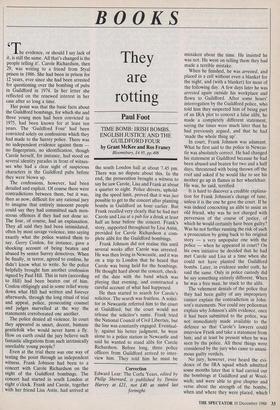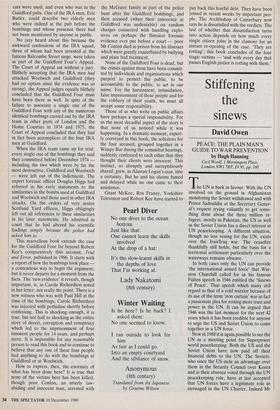BOOKS
They are rotting
Paul Foot
TIME BOMB: IRISH BOMBS, ENGLISH JUSTICE AND THE GUILDFORD FOUR by Grant McKee and Ros Franey
Bloomsbury, £4.95, pp.498
he evidence, or should I say lack of it, is still the same. All that's changed is the people telling it'. Carole Richardson, then 29, was writing to a friend from Styal prison in 1986. She had been in prison for 12 years, ever since she had been arrested for questioning over the bombing of pubs in Guildford in 1974. In her letter she reflected on the renewed interest in her case after so long a time.
Her point was that the basic facts about the Guildford bombings, for which she and three young men had been convicted in 1975, had been known for at least ten years. The 'Guildford Four' had been convicted solely on confessions which they had made to the Surrey police. There was no independent evidence against them — no fingerprints, no identification, though Carole herself, for instance, had stood on several identity parades in front of witnes- ses who had a clear sight of suspicious characters in the Guildford pubs before they were blown up.
The confessions, however, had been detailed and explicit. Of course there were contradictions between them, but it was, then as now, difficult for any rational jury to imagine that entirely innocent people could say they had committed such mon- strous offences if they had not done so. The four, of course, had an explanation. They all said they had been intimidated, often by most savage violence, into saying exactly what the police wanted them to say. Gerry Conlon, for instance, gave a shocking account of being beaten and abused by senior Surrey detectives. When he finally, in terror, agreed to confess, he didn't know what to write. So the police helpfully brought him another confession signed by Paul Hill. This in turn (according to Hill) had been beaten out of him. Conlon obligingly and in some relief wrote down what Hill had written and forever afterwards, through the long ritual of trial and appeal, police, prosecuting counsel and judges marvelled at the way the statements corroborated one another.
The police denied all violence. In court they appeared as smart, decent, humane gentlefolk who would never harm a fly. How on earth could the jury believe such fantastic allegations from such intrinsically unreliable young people?
Even at the trial there was one way of testing the point through an independent witness. Frank Johnson had been to a concert with Carole Richardson on the night of the Guildford bombings. The concert had started in south London at eight o'clock. Frank and Carole, together with her friend Lisa Astin, had arrived at the south London hall at about 7.45 pm. There was no dispute about this. In the end, the prosecution brought a witness to say he saw Carole, Lisa and Frank at about a quarter to eight. Police drivers, uphold- ing the speed limit, proved that it was just possible to get to the concert after planting bombs in Guildford an hour earlier. But Frank recalled very clearly that he had met Carole and Lisa at a pub for a drink at least half an hour before the concert. Frank's story, supported throughout by Lisa Astin, provided for Carole Richardson a com- plete alibi for the Guildford bombings.
Frank Johnson. did not realise this until several weeks after Carole was arrested. He was then living in Newcastle, and it was on a trip to London that he heard that Carole was being held for the bombings. He thought hard about the concert, check- ed the date with the band which was playing that evening, and constructed a careful account of what had happened.
He then started to search for Carole's solicitor. The search was fruitless. A solici- tor in Newcastle referred him to the court at Guildford; but the court would not release the solicitor's name. Frank tried the National Council of Civil Liberties, but the line was constantly engaged. Eventual- ly, against his better judgment, he went alone to a police station in Newcastle and said he wanted to stand alibi for Carole Richardson. Before long, three police officers from Guildford arrived to inter- view him. They told him he must be mistaken about the time. He insisted he was not. He went on telling them they had made a terrible mistake.
When he finished, he was arrested, and placed in a cell without even a blanket for the night, and (with a blanket) for most of the following day. A few days later he was arrested again outside his workplace and flown to Guildford. After some hours' interrogation by the Guildford police, who told him they suspected him of being part of an IRA plot to concoct a false alibi, he made a completely different statement, saying the times were much later than he had previously argued, and that he had 'made the whole thing up'.
In court, Frank Johnson was adamant. What he first said to the police in Newcas- tle was absolutely correct. He had changed his statement at Guildford because he had been abused and beaten for two and a half days, threatened with being thrown off the roof and asked if he would like to see his mother go up in flames in her wheelchair. He was, he said, terrified.
It is hard to discover a credible explana- tion for Frank Johnson's change of tune, unless it is the one he gave the court. If he was indeed concocting an alibi to assist an old friend, why was he not charged with perversion of the course of justice, of which he would certainly have been guilty? Was he not further running the risk of such a prosecution by going back to his original story — a very unpopular one with the police — when he appeared in court? On his own initiative he decided that he had met Carole and Lisa at a time when she could not have planted the Guildford bombs. Later, in evidence under oath, he said the same. Only in police custody did he say something entirely different. When he was a free man, he stuck to the alibi.
The vehement denials of the police that they had been guilty of any impropriety cannot explain the contradiction in John- son's statements. Nor could any policeman explain why Johnson's alibi evidence, once it had been submitted to the police, was not immediately made available to the defence so that Carole's lawyers could interview Frank and take a statement from him; and at least be present when he was seen by the police. All these things were considered by the jury who came to unani- mous guilty verdicts.
No jury, however, ever heard the evi- dence of the IRA squad which admitted some months later that it had carried out the bombings at Guildford and at Wool- wich; and were able to give chapter and verse about the strength of the bombs, when and where they were placed, which cars were used, and even who was in the Guildford pubs. One of the IRA men, Eric Butler, could describe two elderly men who were indeed at the pub before the bombings and whose presence there had not been mentioned by anyone in public.
No jury heard about this because the awkward confessions of the IRA squad, three of whom had been arrested at the famous Balcombe Street siege, were taken as part of the Guildford Four's Appeal. The Court of Appeal sat without a jury.
Blithely accepting that the IRA men had attacked Woolwich and Guildford (they had no option since the evidence was so strong), the Appeal judges equally blithely concluded that the Guildford Four must have been there as well. In spite of the failure to associate a single one of the Guildford Four with any of the numerous identical bombings carried out by the IRA team in other parts of London and the Home Counties in 1974 and 1975, the Court of Appeal concluded that they had in fact been accomplices of the four IRA men at Guildford.
When the IRA team came up for trial, every single one of the bombings they said they committed before December 1974 — including the two which were by far the most destructive, Guildford and Woolwich — were left out of the indictment. The expert forensic officer Douglas Higgs had referred in his early statements to the similarities in the bombs used at Guildford and Woolwich and those used in other IRA attacks. On the orders of very senior Scotland Yard officers, Higgs obligingly left out all references to these similarities in his later statements. He admitted in court that he had altered his scientific findings simply because the police had asked him to.
This marvellous book extends the case for the Guildford Four far beyond Robert Kee's comparatively thin account, Trial and Error, published in 1986. It starts with a report of how the bombings took place — a contentious way to begin the argument; but it never departs for a moment from the facts. The new evidence' it reveals, though important, is, as Carole Richardson noted in her letter, not really the point. There is a new witness who was with Paul Hill at the time of the bombings; Carole Richardson was injected with pethidine shortly before confessing. This is shocking enough, it is true, but not half so shocking as the entire story of deceit, corruption and conspiracy which led to the imprisonment of four innocent people for 14 years, and perhaps more. It is impossible for any reasonable person to read this book and to continue to believe that any one of these four people had anything to do with the bombings at Guildford or at Woolwich.
How to express, then, the enormity of what has been done here? It is true that none of the victims here has been killed, though poor Conlon, an utterly law- abiding and innocent man, arrested with the McGuire family as part of the police hunt after the Guildford bombings, and then accused (when their innocence at Guildford was undeniable) on random charges connected with handling explo- sives on perhaps the flimsiest forensic evidence ever put before a court — poor Mr Conlon died in prison from his illnesses which were greatly exacerbated by bullying and plain bad treatment.
None of the Guildford Four is dead, but the crimes against them have been commit- ted by individuals and organisations which purport to protect the public, to be accountable to the public, to act in our name. For the harassment, intimidation, false imprisonment of these people and for the robbery of their youth, we must all accept some responsibility.
Those of us who write on public affairs have perhaps a special responsibility. For us the most dreadful aspect of the story is that none of us noticed while it was happening. In a dramatic moment, expert- ly conveyed in this book, the solicitors for the four accused, grouped together in a Wimpy Bar during the committal hearings, suddenly confessed to each other that they thought their clients were innocent. This instinct, so abruptly and surreptitiously shared, grew, in Alastair Logan's case, into a certainty. But he and his clients fumed and delayed while no one came to their assistance.
Grant McKee, Ros Franey, Yorkshire Television and Robert Kee have started to pay back this fearful debt. They have been joined in recent weeks by important peo- ple. The Archbishop of Canterbury now says he is dissatisfied with the verdicts. The test of whether that dissatisfaction turns into action depends on how much every single citizen joins in the clamour for an instant re-opening of the case. 'They are rotting', this book concludes of the four tragic victims — 'and with every day that passes English justice is rotting with them.'



























































 Previous page
Previous page